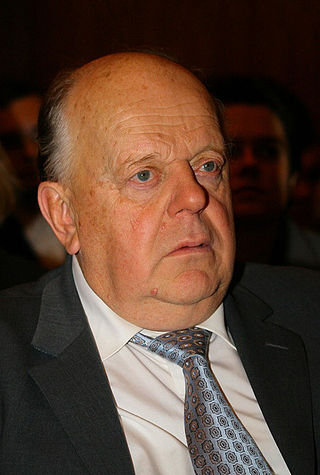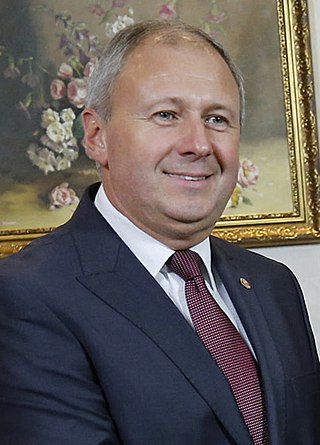
Belarus, officially the Republic of Belarus, is a landlocked country in Eastern Europe. It is bordered by Russia to the east and northeast, Ukraine to the south, Poland to the west, and Lithuania and Latvia to the northwest. Covering an area of 207,600 square kilometres (80,200 sq mi) and with a population of 9.1 million, Belarus is the 13th-largest and the 20th-most populous country in Europe. The country has a hemiboreal climate and is administratively divided into six regions. Minsk is the capital and largest city; it is administered separately as a city with special status.

The Government of the Republic of Belarus, which consists of the Council of Ministers of the Republic of Belarus, is the executive branch of state power in Belarus, and is appointed by the President of Belarus. The head of the Government is the President of Belarus, who manages the main agenda of the government and direct the ministers. The National Assembly of Belarus is the continuation of the Supreme Soviet of the BSSR and acts as the functioning parliament for Belarus.

The politics of Belarus takes place in a framework of a presidential republic with a bicameral parliament. The President of Belarus is the head of state. Executive power is nominally exercised by the government, at its top sits a ceremonial prime minister, appointed directly by the President. Legislative power is de jure vested in the bicameral parliament, the National Assembly, however the president may enact decrees that are executed the same way as laws, for undisputed time.

Alexander Grigoryevich Lukashenko is a Belarusian politician who has been the president of Belarus since the office's establishment in 1994. This makes him the longest-serving European president.

Stanislav Stanislavovich Shushkevich was a Belarusian politician and scientist. From 25 August 1991 to 26 January 1994, he was the first head of state of independent Belarus after it seceded from the Soviet Union, serving as Chairman of the Supreme Soviet. He supported social democratic reforms and played a key role in the creation of the Commonwealth of Independent States.

Belarus elects on national level a head of state—the president—and a legislature. The president is elected for a five-year term by the people. The National Assembly has two chambers. The House of Representatives has 110 members elected in single-seat constituencies elected for a four-year term. The Council of the Republic has 64 members, 56 members indirectly elected and eight members appointed by the president.

Pyotr Mironovich Masherov was a Soviet partisan, statesman, and one of the leaders of the Belarusian resistance during World War II who governed the Byelorussian Soviet Socialist Republic as First Secretary of the Communist Party of Byelorussia from 1965 until his death in 1980. Under Masherov's rule, Belarus was transformed from an agrarian, undeveloped nation which had not yet recovered from the Second World War into an industrial powerhouse; Minsk, the capital and largest city of Belarus, became one of the fastest-growing cities on the planet. Masherov ruled until his sudden death in 1980, after his vehicle was hit by a potato truck.

The State Security Committee of the Republic of Belarus is the national intelligence agency of Belarus. Along with its counterparts in Transnistria and South Ossetia, it kept the unreformed name after declaring independence.

The prime minister of the Republic of Belarus is the deputy head of government of Belarus. Until 1991, it was known as the Chairman of the Council of Ministers of the Byelorussian Soviet Socialist Republic as the head of the government of the constituent republic of the Soviet Union.

The president of the Republic of Belarus is the head of state and head of government of Belarus. The office was created in 1994 with the passing of the Constitution of Belarus by the Supreme Council. This replaced the office of Chairman of the Supreme Council as the head of state. The tasks of the president include executing foreign and domestic policy, defending the rights and general welfare of citizens and residents, and upholding the Constitution. The president is mandated by the Constitution to serve as a leader in the social affairs of the country and to act as its main representative abroad. The duties, responsibilities and other transitional clauses dealing with the presidency are listed in Chapter Three, Articles 79 through 89, of the Constitution.

Vyacheslav Frantsevich Kebich was a Belarusian politician and the first Prime Minister of Belarus from 1991 to 1994.
Gennady Vasilievich Novitsky is a Belarusian politician, born in Mogilev.
Ivan Frolovich Klimov was a Soviet politician. He was the First Secretary of the Baranavichy Voblast Committee of the Communist Party from 1952 to 1953.

Belarus and Israel established diplomatic relations in 1992. In 1947, Belarus voted in favor for the United Nations Partition Plan for Palestine. Belarus operates an embassy in Tel Aviv, while Israel operates an embassy in Minsk. Around 130,000 Belarusian citizens immigrated to Israel during the 1990s under the Law of Return.
Viktar Hanchar, or Viktar Hančar was a Belarusian politician who disappeared and was presumably murdered in 1999. He was born in the village of Radzichava, Slutsk Raion.
Syamyon Georgiyevich Sharetski is a Belarusian former agricultural scientist and politician. He was the last acting Chairman of the Supreme Soviet of Belarus.

Andrei Vladimirovich Kobyakov is a Belarusian politician. He served as the Prime Minister of Belarus between 2014 and 2018, appointed by president Alexander Lukashenko on 27 December 2014. Before this appointment, Kobyakov served as Lukashenko's Chief of Staff from 2012 to 2014.
Mikhail Vasilyevich Kovalev was the Chairman of the Council of Ministers of Byelorussian Soviet Socialist Republic from 10 January 1986 to 7 April 1990. He led the BSSR when the Chernobyl disaster happened in neighboring Ukraine. He was preceded by Vladimir Brovikov and succeeded by Vyacheslav Kebich, who then served as the first Prime Minister of independent Belarus.

Sergei Nikolayevich Rumas is a Belarusian politician and economist who served as Prime Minister of Belarus from 18 August 2018 to 3 June 2020.
The 1991 Belarusian strikes, also referred to in Belarus as the April Strikes, were a series of nationwide strikes and rallies in the Byelorussian Soviet Socialist Republic. Originally in opposition to price increases and a tax on goods from republics sold in another republic, the protests later turned into a broadly anti-Soviet movement, calling for the resignation of Soviet leadership, a reduction of the economic role of the Soviet government, and fresh elections to the Supreme Soviet of the Byelorussian Soviet Socialist Republic.

















